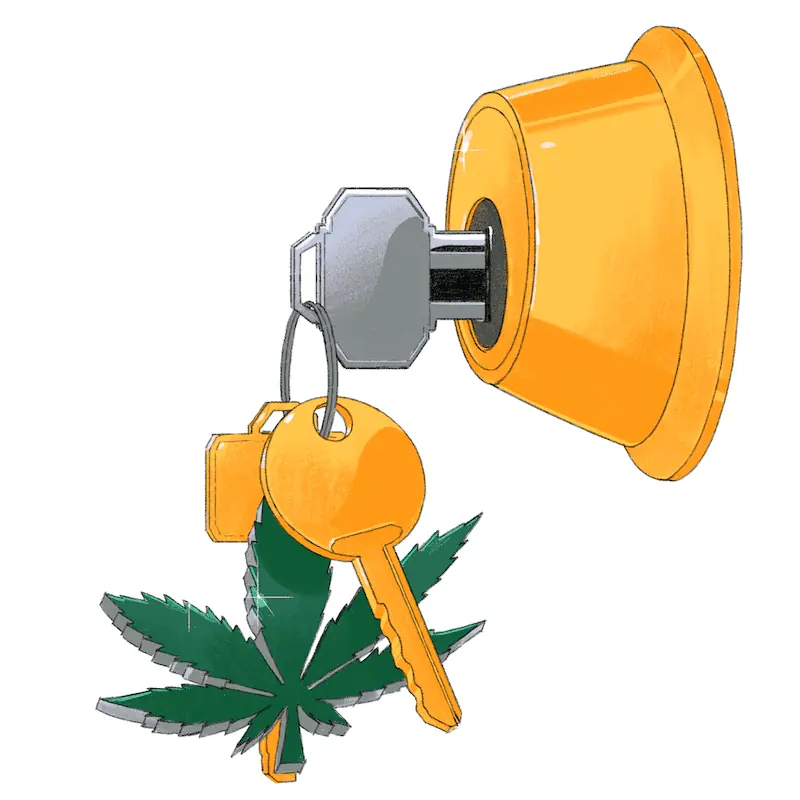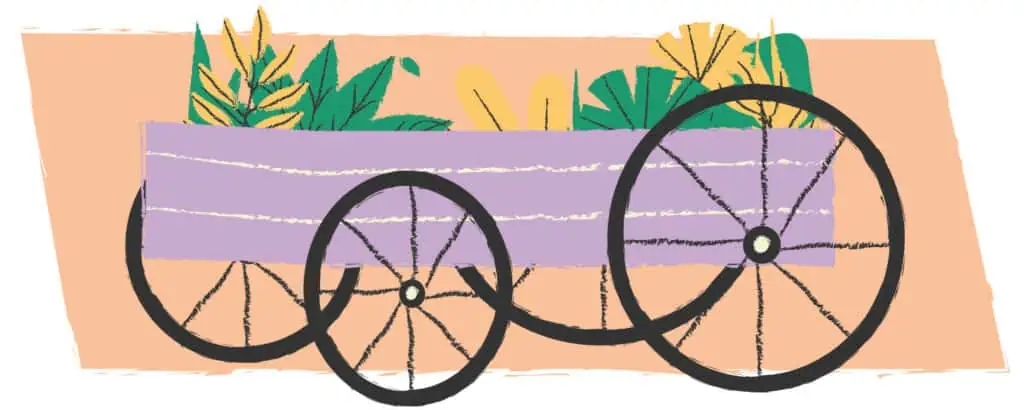With constantly shifting guidelines and laws that differ both federally and state-to-state, the prospect of moving with marijuana can be quite the head trip. (That’s both the first and last weed-related pun, I promise. Please continue reading.)
The list of cannabis-friendly states is getting longer by the day. But even if you’re moving from, say, California to Oregon or within Colorado — states where recreational weed is legal — there are still rules and regulations you need to be aware of if you want to avoid potential misdemeanor or even felony charges.
That’s scary phrasing for sure — I’m in a full sweat just writing it — but don’t panic! A safe, legal, and (mostly) stress-free move with marijuana is possible while we wait for nationwide legalization. The trick is knowing what to look out for. Here’s your comprehensive guide to moving with marijuana.
How are we defining “marijuana”?
There are a lot of different words for the same things, but here’s how the government thinks of it.
Ultimately, we’re talking about transporting what’s currently defined federally as a Schedule I Controlled Substance, which could put you on the hook for confiscation, fines, or even criminal prosecution.
“The government regulates any product with THC levels above 0.3%.”
So let’s break down what that means. “Marijuana” is a psychoactive drug from the Cannabis plant. It’s made up of many compounds that don’t get you high, and one that does: tetrahydrocannabinol, or THC. This is the element of the plant that the law is most interested in. The government regulates any product with THC levels above 0.3%. (Which explains why you’re able to purchase low-THC CBD or CBD isolate in some areas where weed isn’t yet legal.)
What about oils or edibles?
Much higher levels of THC occur naturally in the Cannabis plant, which can be processed into three main products – flower or fruit, resin, and oil – that can be smoked, vaped, or cooked into food products and consumed as what are called “edibles”. And even though all these forms are different, encompassing myriad indica, sativa, and hybrid strains, once you cross that 0.3% THC mark, they all fall under the same umbrella of legality or illegality, depending on the area.
That means no matter the potency of your product, and whether you’re traveling with gummies, a vape pen, processed flower, or even the living plants themselves, in the eyes of the law, you are officially Moving With Marijuana™.
See prices for local moving labor. Read real customer reviews. Easily book your help online.
Which states is recreational marijuana legal in 2024?
As of this writing recreational marijuana has been fully legalized in 24 states:
- Alaska
- Arizona
- California
- Colorado
- Connecticut
- Delaware
- Illinois
- Maine
- Maryland
- Massachusetts
- Michigan
- Minnesota
- Missouri
- Montana
- New Jersey
- New Mexico
- New York
- Nevada
- Ohio
- Oregon
- Rhode Island
- Vermont
- Virginia
- Washington
- *and also Washington, D.C.
Assuming you’re of age and moving from a city in one of the above states to somewhere else within the same state, you have very little to worry about—as long as the amount you’re carrying is below state limits (in California, for example, that means under an ounce), and you stay off the interstate highways. (More on that later.)
Legal vs. Decriminalized
Meanwhile, some states have elected to simply decriminalize marijuana, meaning the possession and consumption of marijuana remains illegal, but the penalties for such are civil instead of criminal. Criminal charges can result not only in hefty fines and even jail time, but also in a criminal record which can have implications regarding future employment, housing, travel, even personal relationships and mental health — consequences that some believe are overly severe for simple marijuana offenses.
As of this writing, there are seven states where marijuana has been decriminalized but remains a civil offense:
- Hawaii
- Louisiana
- Mississippi
- Nebraska
- New Hampshire
- North Carolina
- North Dakota
Which states is medical marijuana legal in 2024?
A number of states have legalized the possession and use of marijuana for medicinal purposes. Note that some of these states have also decriminalized marijuana while others have not. User beware.
States that have legalized medical marijuana:
- Alabama
- Arkansas
- Florida
- Georgia*
- Indiana*
- Iowa*
- Kentucky*
- Louisiana
- Mississippi
- New Hampshire
- North Dakota
- Oklahoma
- Pennsylvania
- South Dakota
- Tennessee*
- Texas*
- Utah
- West Virginia
- Wisconsin*
*States with legal medicinal marijuana limited to CBD Oil. Note that none of these seven states has decriminalized marijuana.
If you are moving within one of these nineteen states and are discovered to have any weed on your person, you’ll be asked to present your medical marijuana patient card. If you can’t produce such evidence of medical use, you’ll be in civil if not criminal hot water.
Are there any states where marijuana is still illegal?
Yes. Presently there are four states where marijuana remains entirely illegal, even for medicinal purposes:
- Idaho
- Kansas
- South Carolina
- Wyoming
Now, you might think that as long as you are only moving to and through states where weed is fully legal you’re sitting pretty. But unfortunately, that is not the case.
What are the differences between state and federal regulations of weed?
Even if you are abiding by the laws of each state you pass into or through, you are still breaking the law if you cross state lines with marijuana because marijuana has not been federally legalized in the United States. This means that in any areas controlled by the federal government — which includes interstate highways and state borders — weed is considered an illegal drug on par with substances like heroin, methamphetamine, and cocaine.
When you transport a Schedule I substance across state lines, you can be deemed a drug trafficker in the eyes of the law. (That’s a pretty intense career change for someone with half a bag of pink lemonade edibles in their glove compartment.)
“…marijuana has not been federally legalized in the United States.”
You might just get a slap on the wrist from state officers depending on the quantity, your criminal history, and the reason behind the stop. But the Drug Enforcement Administration (DEA) is equipped to mete out serious penalties of a minimum of five years in prison and a maximum $250,000 fine for anyone transporting less than 50kg of marijuana – even for a first-time offense – if you are determined to be trafficking drugs.
So it bears repeating: interstate highways and state borders fall under federal jurisdiction. State laws don’t apply.
You could still find yourself dealing with Big Daddy DEA, even with a medical marijuana card at the ready, and even if you’re still within the state that issued it. Under federal jurisdiction, marijuana remains illegal across the board.
See prices for local moving labor. Read real customer reviews. Easily book your help online.
What about transporting marijuana for business purposes?
It’s important to note that everything we’ve discussed so far above moving with weed applies specifically to individuals. If you’re the owner of a cannabis-related business, you’ll almost certainly need a license to transport marijuana, even within your state. (And naturally, such licenses are available only within states that have legalized weed.)
To get your license, and to get information on other state-by-state transportation requirements you’ll need to adhere to, contact your state’s licensing authorities.
Moving companies and marijuana
Moving companies have certain items they aren’t willing to move for customers; a list that often includes stuff like plants or animals, perishable food items (which rules out edibles), or anything flammable. And while most moving companies don’t have a stated policy about moving illegal drugs, we can use common sense to assume they aren’t super psyched at the thought of breaking the law for you. Especially because many companies are strict about asking customers not to pack legal and prescription drugs, in case you end up needing quick access during a move.
So even if the company you move with doesn’t have a written policy, remember to use your best judgment when deciding whether to involve a business entity.
Is it safe to cross international lines with marijuana?
In a word, no. While highway patrol officers and state border agents need probable cause to conduct a search, international border patrol officers do not. They can go through your vehicle with a fine-toothed comb, search you personally, and even check your social media accounts, all on the basis of finding you “suspicious”.
“…Interstate highways and state borders fall under federal jurisdiction.”
If they find drugs or even drug paraphernalia, you’ll almost certainly face penalties both at home and abroad, and it’s not uncommon to be permanently denied entry to the country based on a single violation. So basically, just skip it. Moving is stressful enough without getting involved in international intrigue.
The takeaways
If you are at all unsure of the law as it applies to you and your move, your best option is probably to smoke ‘em if you got ‘em before hitting the highway, and then legally purchase more once you reach your destination.



 goats, sheep, and pigs to name a few. Less common animals such as water buffalo, ostriches, alpacas, and reindeer are also free from licensing requirements. Because all of these animals are considered widely domesticated, they’re exempt.
goats, sheep, and pigs to name a few. Less common animals such as water buffalo, ostriches, alpacas, and reindeer are also free from licensing requirements. Because all of these animals are considered widely domesticated, they’re exempt. 

 Note that local municipalities may impose stricter laws than what the state has outlined. Along the Front Range area (i.e. just east of the Rocky Mountains), and especially in Boulder, you’ll want to check with the local authorities before you start driving around with a loaded pistol. It is also illegal to carry a firearm while under the influence of alcohol or a controlled substance.
Note that local municipalities may impose stricter laws than what the state has outlined. Along the Front Range area (i.e. just east of the Rocky Mountains), and especially in Boulder, you’ll want to check with the local authorities before you start driving around with a loaded pistol. It is also illegal to carry a firearm while under the influence of alcohol or a controlled substance.